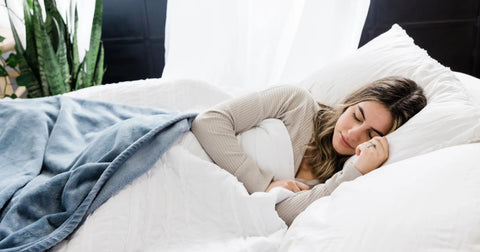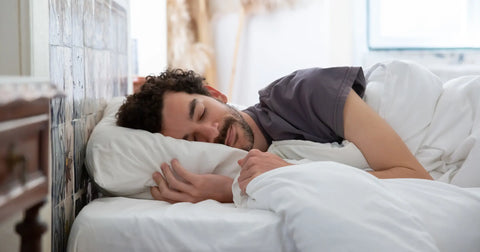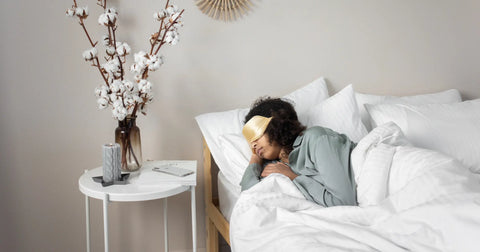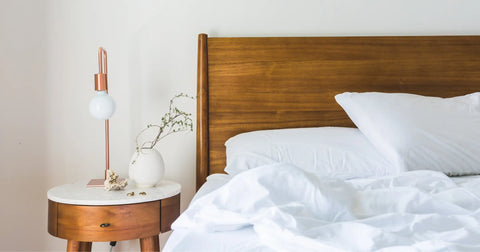Your Cart is Empty
- Shop
- About
- Learn
- Free Domestic Shipping Over $50
- +1(800)929-8935
- Login
- Free Domestic Shipping Over $50
- +1(800)929-8935

(Last Updated: February 2026)
The best direction to sleep scientifically depends more on position than compass orientation. Research generally recommends side sleeping for spinal alignment. Some traditions suggest facing east or south, but comfort and posture remain the most important factors.
If you're wondering which direction you should sleep, the short answer is: position matters more than compass direction. However, some traditions and sleep science perspectives suggest subtle benefits depending on orientation.
Most people do best sleeping on their side, and if you’re choosing a direction, left-side sleeping is often the most comfortable option for digestion and reflux. That said, the “best” direction can change depending on congestion, shoulder pain, pregnancy, or how you breathe at night.
If you’re here for a simple answer: start with the left side, then adjust for comfort and breathing.
If you’re not sure which way to sleep, choose your side, and try the left side first.
If your sleep position is about breathing comfort, these may help:
Dry air at night? Here’s how bedroom humidity affects sleep quality.
Waking up congested? Tips for a stuffy nose at night (without overthinking it).
Want deeper rest overall? A simple guide to sleep hygiene that actually sticks.
While it might seem like a small detail, aligning your sleep environment with these principles is often done with the goal of improving deep sleep and ensuring you wake up ready for the day. Whether you are looking to calm a racing mind or simply find a layout that feels more grounded, exploring how orientation affects your rest can be a fascinating part of optimizing your sleep hygiene.
In this article, we will look into the theories behind sleep direction, separating cultural beliefs from scientific inquiry. We will also provide practical tips to help you arrange your space for a more peaceful and restorative night's sleep.
Recent scientific research suggests there might be more to the direction we sleep in than previously thought. Studies are increasingly focusing on how our sleeping position could potentially align with or against Earth's magnetic field, an aspect of our environment that is pervasive yet often overlooked.1

The human body, responsive to numerous environmental cues, might also react subtly to magnetic fields. For instance, some researchers hypothesize that sleeping with your head pointing north, in line with the Earth's magnetic north, could influence aspects of your physiology, such as brain function and blood flow, potentially leading to disturbed sleep or even impacting conditions like sleep apnea.2
Moreover, sleeping in a particular direction relative to the Earth's axis, such as the north-south direction, might enhance sleep quality by promoting proper spinal alignment and optimizing blood pressure levels.
This intersection of sleep science and geomagnetism is expanding, offering fascinating insights into how even the Earth's subtle forces could affect the deep sleep phases crucial for cognitive and physical recovery.

Numerous cultural traditions have long asserted the importance of the ideal sleeping direction. In the Hindu architectural philosophy of Vastu Shastra, it is suggested that sleeping with one's head pointing south harnesses positive energy, which promotes a good night's sleep and overall well-being.3
Similarly, the ancient Chinese practice of Feng Shui considers the positioning of the bed in relation to the bedroom door and walls crucial for harnessing good chi (energy), with recommendations often advising against sleeping with your head facing north due to negative implications for health.4
These cultural practices emphasize not just the physical aspect of the sleeping position but also its spiritual and energetic implications. They suggest that the right alignment can transform the bedroom into a sleep sanctuary, promoting not only sleep hygiene but also nurturing positive mental health.
Both Vastu Shastra and Feng Shui reflect a broader human endeavor to align our living spaces with natural and cosmic forces, aiming to optimize physical health and spiritual harmony.
Through this exploration of both contemporary scientific perspectives and age-old cultural beliefs, it becomes clear that the direction we choose to sleep in might play a more critical role in our lives than we might assume. Each approach—whether grounded in sleep science or steeped in tradition—offers unique insights into how best to structure our sleep environment for optimal health and well-being.

The orientation in which we sleep may subtly yet significantly affect our overall sleep quality, which in turn influences our quality of life.
Scientific research and sleep medicine have begun to examine more closely how factors like sleep direction correlate with the stages of sleep, particularly deep sleep, and REM (rapid eye movement) sleep, essential for mental and physical restoration.5
For instance, aligning your sleep position with the Earth's north-south axis may promote better sleep quality by potentially enhancing blood flow and minimizing disruptions caused by the Earth's magnetic pull. Such alignment might also help mitigate sleep disturbances and foster a more restful sleep, thereby supporting cognitive functions, emotional stability, and physical health.5
Moreover, the direction your head faces while sleeping, whether north, south, east, or west, could be integral in preventing or exacerbating sleep disorders such as sleep apnea. By optimizing your sleep environment to accommodate the best sleeping direction for your body, you are more likely to experience restful sleep, which is directly linked to improved mental health and overall well-being. Sleep quality and emotional balance are closely connected; supporting both can make a meaningful difference over time.

Selecting the ideal sleep direction might seem daunting, but it can be simplified with a few considerations:
Personal Health: Start with your health status; for example, those with conditions like sleep apnea might find relief in a specific sleeping position. Consulting with a sleep specialist can provide tailored advice that enhances your sleep quality based on your wellness needs.
Bedroom Layout: Your bed's placement relative to windows, doors, and bedroom walls can affect your sleep quality. Ensure your bed placement promotes a calm, secure environment free from draughts and disturbances. Feng Shui and Vastu Shastra suggest avoiding alignments directly in line with doors or under windows, as these may disrupt sleep.
Geographic Location: Considering local variations in the Earth’s electromagnetic fields might also be beneficial. For example, those living near the north pole and south pole may experience different effects from those living closer to the equator due to variations in Earth's magnetic fields.
Experimentation: Sometimes, personal experience is the best guide. Try different orientations and assess how each can affect sleep quality. Look for changes in how quickly you fall asleep, the frequency of waking up at night, and how rested you feel in the morning.
While sleeping direction can impact sleep quality, several myths need clarification:
The notion that there is a universally ideal sleep position is a common misconception. The optimal direction for sleep varies greatly depending on individual health considerations, lifestyle, and even geographic location. What works best for one person might not be ideal for another, making personalized assessments crucial.
Some beliefs suggest that the incorrect orientation of the bed blocks positive energy flow, which can directly cause health issues. While the alignment of your bed can influence the quality of your sleep due to environmental factors, the idea of energy blockages affecting health has more to do with the principles of Feng Shui and Vastu Shastra than scientific evidence.
In some cultures, particularly those practicing Feng Shui, it is believed that sleeping in a certain direction can increase wealth or personal fortune. This belief lacks scientific backing but is deeply rooted in cultural traditions. It emphasizes the psychological and spiritual comfort people may find in this practice rather than any direct physical health benefits.
Another specific myth is that sleeping with your head pointed south can lead to health risks, including high blood pressure and other cardiovascular problems. This notion is not supported by modern medical science, which bases health advice on observable, repeatable evidence rather than directional sleep.

Creating a sleep-friendly environment is crucial to prevent sleep deprivation and ensure that the benefits of your chosen sleep direction are fully realized. Here are some tips to optimize your bedroom setting:
Comfortable Bedding: Invest in high-quality mattresses and pillows that support proper spinal alignment and accommodate your ideal sleep position. Ensure your bedding is suitable for the climate and comfortable, as this can significantly affect sleep quality.
Reduce Light and Noise: To create a tranquil atmosphere, minimize external light and noise. Use heavy curtains or blackout shades to block street lights and morning sunlight, and consider white noise machines or earplugs if you are sensitive to sound.
Control Temperature: Maintain a comfortable temperature in your bedroom. The optimal temperature for sleep is generally around 65 degrees Fahrenheit (18 degrees Celsius). Adjust your bedding and room temperature to find what helps you sleep best.
Electromagnetic Fields: Be mindful of electronic devices and outlets. Keep mobile phones, tablets, and other electronics away from your bed to minimize exposure to electromagnetic fields, which could lead to poor sleep quality.
Aesthetic and Layout: Align your bed so that it feels open and inviting. Avoid placing the bed in direct alignment with the door, and try to have a solid wall behind the bed for a sense of security and stability.
Optimize Your Sleep from the Inside Out
Aligning your bed helps, but true restoration starts with your brain chemistry. Mellodyn works with your body's natural rhythms to promote deep, uninterrupted sleep, no matter which way you face.
Read next: 9 Natural Sleep Remedies: How to Improve Your Sleep Quality
While the ideal sleeping position and direction can vary significantly between individuals, understanding and applying the principles behind optimal sleep direction can enhance your sleep quality and, by extension, your overall health and well-being.
Whether you follow scientific guidelines or cultural beliefs, the goal remains the same: to create a sleep environment that promotes deep, restful sleep.
Remember, good sleep hygiene and a personalized approach to your sleeping arrangement can have a profound impact on your life, from better mental health to improved physical health.
Explore, experiment, and prioritize what works best for you, ensuring that every night’s sleep moves you toward greater health and happiness.
Beyond sleep direction, quality sleep depends on brain chemistry. Mellodyn Sleep Easy works with your body's natural sleep-wake cycles to promote deeper, more restorative rest, no matter which way you face.
Experience better sleep with Mellodyn.
If position changes help but you still feel restless at night, consider pairing your routine with gentle, natural sleep support designed to complement healthy habits.
What does “social battery” mean?
Social battery refers to a person’s capacity to engage in social interactions before feeling mentally or emotionally drained. It describes how socializing can either energize or exhaust someone over time.
What is social energy?
Social energy is the mental and emotional energy used during social interactions. It can fluctuate based on factors like personality, stress levels, environment, and how stimulating or demanding social situations are.
Why does my social battery get drained quickly?
A social battery may drain quickly due to overstimulation, stress, lack of rest, or extended social interaction without breaks. Introverted tendencies or emotional overload can also contribute to faster depletion.
Is having a low social battery normal?
Yes, having a low social battery is normal and varies from person to person. Energy levels can change depending on mood, health, sleep quality, and current life demands.
How can you recharge your social battery?
Recharging a social battery often involves spending time alone, engaging in calming activities, or setting boundaries around social commitments. Rest, quiet environments, and doing enjoyable solo activities can help restore social energy.
Chen, S. H., Chin, W. C., Huang, Y. S., Chuech, L. S., Lin, C. M., Lee, C. P., Lin, H. L., Tang, I., & Yeh, T. C. (2022). The effect of electromagnetic field on sleep of patients with nocturia. Medicine, 101(32), e29129. https://doi.org/10.1097/MD.0000000000029129
Yang, L., Jiang, H., Ding, X., Liao, Z., Wei, M., Li, J., Wu, T., Li, C., & Fang, Y. (2022). Modulation of Sleep Architecture by Whole-Body Static Magnetic Exposure: A Study Based on EEG-Based Automatic Sleep Staging. International journal of environmental research and public health, 19(2), 741. https://doi.org/10.3390/ijerph19020741
What is Vastu Shastra? All about it here. (2023, December 27). The Times of India. https://timesofindia.indiatimes.com/speaking-tree/vastu-and-feng-shui/what-is-vastu-shastra-all-about-it-here/articleshow/106325184.cms
Feng Shui Bed Placement for Positive Energy. (2024, February 7). Architectural Digest. https://www.architecturaldigest.com/reviews/home-improvement/feng-shui-bed-placement
Zhang, Y., Xiao, A., Zheng, T., Xiao, H., & Huang, R. (2022). The Relationship between Sleeping Position and Sleep Quality: A Flexible Sensor-Based Study. Sensors (Basel, Switzerland), 22(16), 6220. https://doi.org/10.3390/s22166220